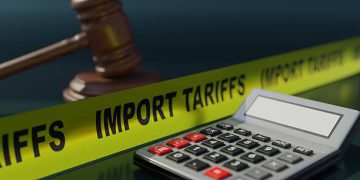Supply Chain Report – 10/06/2025
President Donald Trump on Thursday signed an executive order formalizing a wide range of tariff increases and trade arrangements with major international partners. The move represents one of the most significant trade policy shifts in recent decades and has generated both market uncertainty and debate among businesses and policymakers.
The order finalized agreements with the European Union, Japan, South Korea, the United Kingdom, and the Philippines. At the same time, tariff levels were unilaterally set for nations that did not reach agreements with the U.S., including Switzerland, Taiwan, and Israel. Switzerland will face tariffs of 39%, while Taiwan’s rate was set at 20%.
During an interview with NBC News, Trump emphasized his willingness to remain open to further negotiations, saying his administration is prepared to consider new proposals from trading partners in the weeks ahead.
Impact on Canada and Market Response
Canadian Prime Minister Mark Carney expressed disappointment over the decision to raise tariffs on Canadian exports from 25% to 35% for goods not covered by the existing USMCA trade pact. He rejected the U.S. justification that the move was tied to cross-border drug trafficking concerns.
Financial markets responded quickly to the tariff announcement. Stock indices in Europe and the U.K. saw modest declines, while Asian markets, particularly South Korea and Japan, experienced steeper drops. Analysts noted that South Korea’s market fell nearly 4% on Friday morning trading, marking one of the sharpest reactions globally.
Timeline and Logistics
The tariffs will not take immediate effect. According to the order, new duties are scheduled to begin on August 7. Goods arriving by sea, which account for more than half of U.S. imports, will not be subject to the new rates until October 5, provided they were shipped before the August deadline. This creates a window where importers may accelerate shipments to avoid higher costs.
While administration officials had previously insisted there would be no delay, Trump granted a 90-day extension on negotiations with Mexico, the United States’ largest trading partner. Discussions are also ongoing with China regarding its upcoming tariff deadline.
Economic Concerns and Inflation Risks
The tariff plan has heightened concerns among economists about its impact on inflation and long-term economic growth. Trump has highlighted the revenue already collected from tariffs — approximately $125 billion — and projected future investments pledged by international partners. However, businesses remain cautious, pointing to higher costs, supply chain disruptions, and the potential for slower consumer demand.
The Federal Reserve has also acknowledged uncertainty about the broader effects of tariffs. Chair Jerome Powell noted that policymakers are monitoring inflation trends closely, as consumer prices rose 2.7% in June, continuing an upward trend from previous months. Powell indicated the Fed would avoid adjusting interest rates prematurely, warning of risks to both inflation control and employment.
Business and Consumer Impact
Industry groups, including the National Retail Federation, have raised concerns that the new tariff measures will increase costs for businesses and consumers alike. According to the Yale Budget Lab, the average effective tariff rate now stands near 18%, which could add roughly $2,000 annually to household expenses.
While the administration has argued that tariffs will help revive U.S. manufacturing, evidence of job growth in the sector has been limited. Some manufacturers stress the difficulty of planning for long-term investments given frequent shifts in tariff policy. One Texas manufacturer described the environment as “Tariffs. Tariffs. Tariffs. Did I mention tariffs?” in a recent Federal Reserve survey.
Outlook
Although tariffs are expected to generate additional government revenue, economists caution that they will not fully address fiscal challenges. Businesses and consumers are bracing for continued uncertainty in the coming months, with analysts suggesting that while tariffs may stabilize certain sectors, they are unlikely to resolve broader economic concerns.
“Uncertainty may lessen in the short term, but it is unlikely to disappear,” analysts from Bank of America noted. Experts add that tariff-related debates will remain a central issue for the administration as negotiations with trading partners continue.
#SupplyChainNews #TariffImpact #GlobalMarkets #EconomicUpdate #TradePolicy















